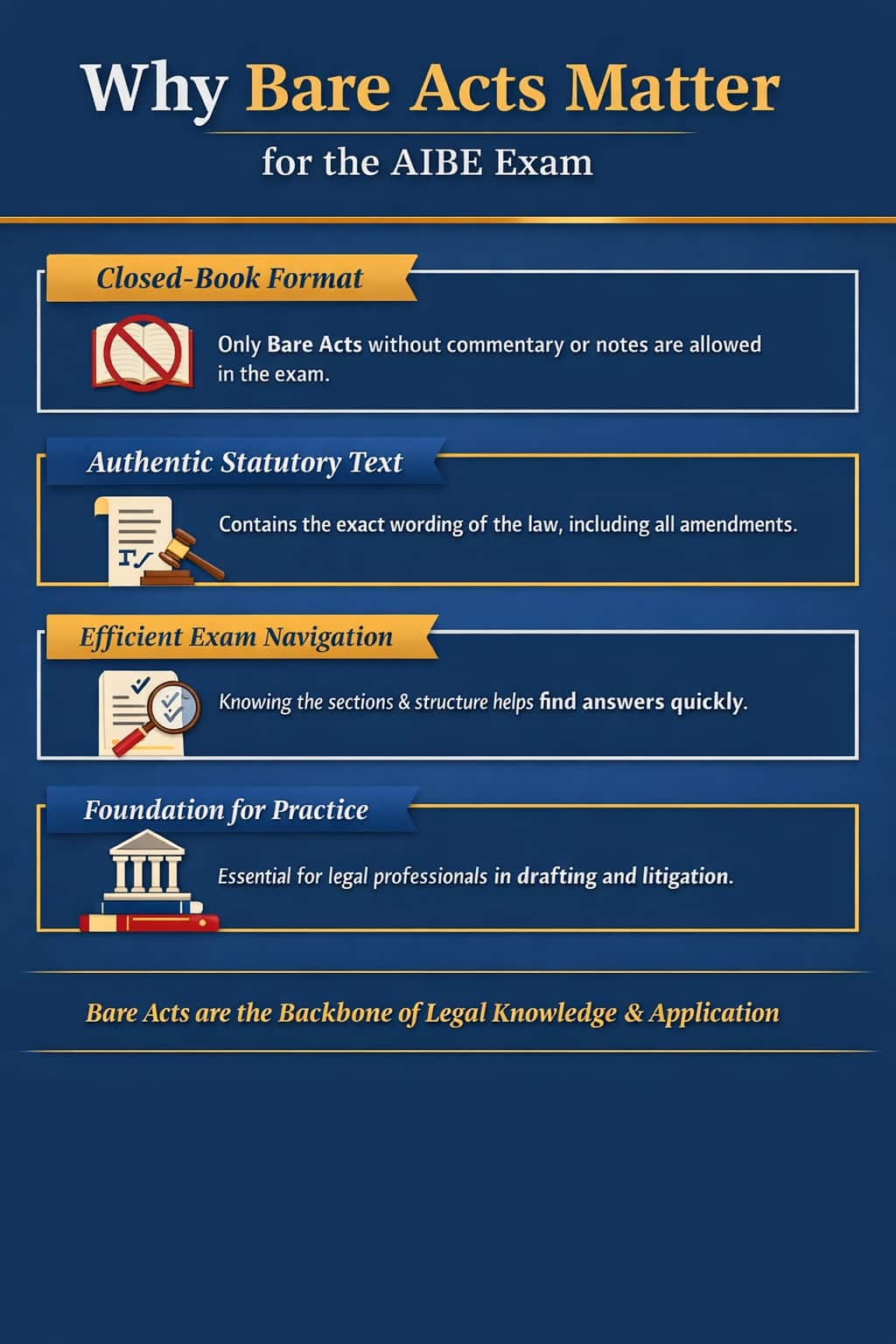Jindal Global Law School Admissions 2026
Ranked #1 Law School in India & South Asia by QS- World University Rankings | Merit cum means scholarships | Early Admissions (Pahse 2) Deadline: 28th Feb’26
The All India Bar Examination (AIBE) 21 – 2026 places strong emphasis on a candidate’s practical understanding of Bare Acts, making them one of the most crucial resources for exam preparation. Since AIBE is an open-book exam, success depends not on memorising provisions but on knowing which Act to refer to, where a particular section is located, and how to apply it accurately. A well-planned approach to studying Bare Acts helps aspirants quickly navigate legal provisions, interpret statutory language, and answer problem-based questions efficiently. This article covers the important Bare Acts for AIBE 21, effective strategies to study them, and key points candidates must focus on to maximise their score.
This Story also Contains

The AIBE 21 Exam Pattern consists of 100 multiple-choice questions (MCQs) for a total of 100 marks. Each question will be worth one mark. There are no penalty points for wrong responses. The AIBE 21 is an open-book test, which means that applicants can bring Bare Acts for AIBE 21 into the examination venue.
Aspect | Details |
Weightage in AIBE | More than 70% of AIBE questions are directly based on Bare Acts |
Exam Nature | AIBE is an open-book examination requiring efficient use of Bare Acts |
Purpose of Bare Acts | Helps in identifying, interpreting, and applying legal provisions |
Key Areas to Focus | Important sections, definitions, punishments, schedules |
Study Techniques | Highlight crucial sections, mark frequently asked provisions |
Marginal Notes | Should be read carefully as they indicate the scope of sections |
Time Management | Practising quick scanning is crucial to locate answers during the exam |
Accuracy | Exact statutory language reduces the chances of incorrect answers |
Reliability | Bare Acts are the most authentic and error-free source of law |
Exam Restriction | Bare Acts with commentary are not permitted in the AIBE exam |
The All India Bar Examination (AIBE) has transitioned from a traditional open-book format to a restricted open-book format, where only Bare Acts without commentary, notes, or case laws are permitted inside the examination hall.

Below is a curated list of essential AIBE 21 Bare Acts for candidates appearing in AIBE 21, as these statutes form the primary source of exam questions. While the number of Bare Acts may vary by publisher or edition, the list covers the most relevant and frequently tested laws. Since some statutes may be amended or replaced, candidates are advised to refer to the latest Bar Council of India (BCI) notifications to stay aligned with the current AIBE syllabus and exam pattern.
S. No. | Bare Act (Short Title) | Description / Importance |
1 | The Constitution of India | Fundamental law of the country; covers fundamental rights, duties, directive principles, federal structure, and constitutional authorities. |
2 | The Advocates Act, 1961 | Governs enrolment, regulation, and professional conduct of advocates; highly relevant for AIBE. |
3 | The Indian Penal Code, 1860 | Core criminal law statute defining offences and punishments (subject to replacement by the Bharatiya Nyaya Sanhita). |
4 | The Code of Criminal Procedure, 1973 | Prescribes procedure for investigation, inquiry, trial, and appeal in criminal cases. |
5 | The Indian Evidence Act, 1872 | Lays down rules relating to admissibility and appreciation of evidence (being replaced by the Bharatiya Sakshya Adhiniyam, 2023). |
6 | The Code of Civil Procedure, 1908 | Governs civil court procedures, including suits, execution, appeals, and interim reliefs. |
7 | The Limitation Act, 1963 | Prescribes limitation periods for filing suits, appeals, and applications; frequently tested in AIBE. |
8 | The Specific Relief Act, 1963 | Deals with civil remedies such as specific performance, injunctions, and declaratory reliefs. |
9 | The Indian Contract Act, 1872 | Covers formation, performance, breach, and discharge of contracts; a foundational statute. |
10 | The Arbitration and Conciliation Act, 1996 | Governs arbitration, conciliation, and enforcement of awards; an important ADR statute. |
11 | The Negotiable Instruments Act, 1881 | Deals with cheques, promissory notes, and bills of exchange; Section 138 is frequently tested. |
12 | The Transfer of Property Act, 1882 | Governs transfer of immovable property including sale, mortgage, lease, and actionable claims. |
13 | The Indian Trusts Act, 1882 | Regulates private trusts; often studied alongside property and equity principles. |
14 | The Hindu Marriage Act, 1955 / Special Marriage Act, 1954 | Family law statutes governing marriage, divorce, maintenance, and matrimonial remedies. |
15 | Professional Ethics & Code of Conduct (BCI Rules) | Regulates professional conduct, duties, and discipline of advocates. |
16 | The Motor Vehicles Act, 1988 | Statutory framework for motor accident claims, liability, and compensation. |
17 | The Consumer Protection Act (as applicable) | Provides remedies for consumer disputes and establishes consumer redressal forums. |
18 | Labour & Industrial Laws (e.g., Industrial Disputes Act, Minimum Wages Act, Payment of Wages Act) | Important for labour law questions as per the AIBE syllabus. |
19 | Taxation Laws (as prescribed in syllabus) | Covers basic principles under “Law related to Taxation” subject for AIBE. |
NOTE: The above list is indicative and not exhaustive. Different publishers may offer sets of 20 or 25 Bare Acts depending on their compilation. Additionally, where older statutes have been repealed or replaced (for example, the Indian Evidence Act being replaced by the Bharatiya Sakshya Adhiniyam), candidates must ensure that the latest applicable statute is included in their AIBE 21 preparation and carried for the examination.
The AIBE 21 2026 syllabus is divided into core legal subjects, including Constitutional Law, Criminal Law, Civil Procedure, Evidence, Arbitration, Commercial Laws, and allied areas. Each subject in the syllabus is directly linked to specific statutes, making Bare Acts the primary and indispensable study material for the examination. The basic principle of AIBE preparation is simple: for every subject listed in the syllabus, the corresponding Bare Act must be studied.
For example, if the syllabus includes the Code of Criminal Procedure, 1973, candidates are expected to refer to and understand the Bare Act of the same statute. The list of Bare Acts, therefore, acts as a mapped, subject-wise reading list aligned with the AIBE syllabus.
The AIBE syllabus explicitly mentions subjects such as:
Constitutional Law
Indian Penal Code and Bharatiya Nyaya Sanhita
Criminal Procedure Code
Evidence Act and Bharatiya Sakshya Adhiniyam
Ranked #1 Law School in India & South Asia by QS- World University Rankings | Merit cum means scholarships | Early Admissions (Pahse 2) Deadline: 28th Feb’26
Among top 100 Universities Globally in the Times Higher Education (THE) Interdisciplinary Science Rankings 2026
Candidates must ensure they possess and study the relevant Bare Acts or their latest statutory replacements, wherever applicable. An updated and syllabus-aligned collection of Bare Acts is essential for effective AIBE preparation and ensures that candidates focus only on what the examination intends to test.
Well AIBE bare Acts could be struggling for many, but studying where art effectively requires not only misunderstanding, but the provisions, but also retaining the key concept, essential concepts. Essential ingredients for the future application below are the seven tips to study and remember the acts:
Structure is the king: understanding the structure of the AIBE Bare Acts, such as subsections, definitions and explanations and the comments that are provided following a standard layout beginning with the definitions and then detailing the provisions would be a good start. Focus on the definitions and usage of key terms would be the key to determining how other sections are interpreted.
Summarise: just plain reading of AIBE Bare Acts would not be enough after reading each section. Write a brief summary in your own words, and then reinforce your understanding of the essence of grasping the provisions, making important details into bullet points would be helpful for longer retention.
Highlighting: your bar must look like a colourful circus. The important word such as shall, May, provided that, not with tanding, which indicates mandatory provisions or exceptions. Colour coding of AIBE Bare Acts can be done to quickly recall specific points.
Ex visceribus actus: as it says an act should not be read in isolation, creating visual interpretation in terms of flow. Charge diagrams are mind. Mark with the help of section linkages would help to understand and interpret the complete idea of the Bare Acts for AIBE exam section altogether.
Study, colour, breakdown, repeat: by going over the Barrock periodic layer petition is crucial for transferring information for short-term and long-term memory. Active recalling and reading bear act again and again actively engage your memory and keep the main sections in mind.
Mnemonics is the saint: For AIBE Bare Acts acronyms or short sentences to remember complicated provisions would be helpful such as keeping in mind the 12 schedules of the Constitution, we can use, “ tears of old pm “
Flashcards for flash revision: AIBE Bare Acts, creating flashcards with key sections or definitions and regularly quizzing yourself as a great way to test a memory and reinforce retention read from multiple sources with the legal commentary will provide you better insight and explanations that enhance the understanding.
Frequently Asked Questions (FAQs)
AIBE is conducted in English as well as in several regional languages such as Hindi, English, Bengali, Telugu, Tamil, Gujarati, Marathi, Kannada, Odia, Assamese, and Punjabi.
The candidate needs a law, degree certificate, enrolment certificate from the state bar Council, scanned photograph, and signature, other identity documents as required such as Aadhaar card, PAN card, voter ID, passport, or any of them.
The AIBE is conducted for toal 3hours and 30 minutes.
It takes a few months from the bar Council of India to issue the certificate of practice once you pass the exam.
On Question asked by student community
Hello Student,
You can download the question papers and the solutions for AIBE 18 from the following link -
E-Book Link - AIBE 18 Question Paper with Solutions PDF
Hope this was helpful!
The required documents for the AIBE 21 (2026) exam for the final year law students are:
Marksheets (Self-Attested & Scanned): All previous semester marksheets (Semester I to V for 3-year LLB; Semester I to IX for 5-year Integrated LLB).
Undertaking Form: A signed, scanned undertaking form indicating you are in
AIBE 21 (XXI) 2026 registration has started, with the exam scheduled for June 7, 2026. Please visit this link to find the previous year's question papers of AIBE with answers to help you with your preparation.
The AIBE 21 exam will be conducted on June 7, 2026. You can check the previous year AIBE question papers here.
Among top 100 Universities Globally in the Times Higher Education (THE) Interdisciplinary Science Rankings 2026
NAAC A+ Accredited | Among top 2% Universities Globally (QS World University Rankings 2026)
Admissions open for B.A. LL.B. (Hons.), B.B.A. LL.B. (Hons.) and LL.B Program (3 Years) | School of Law, MRU ranked No. 1 in Law Schools of Excellence in India by GHRDC (2023)
Excellent curriculum; an impressive range of electives, besides core law courses. Up to 100% merit scholarship on a first-come, first-served basis
Moot Court | Mock trials | Legal Aid Clinic
NAAC A++ Accredited | Ranked #11 by NIRF